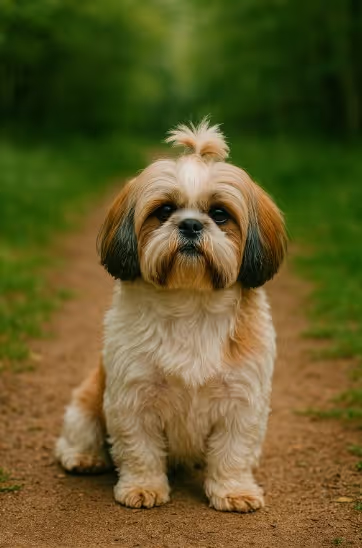The Shih Tzu is a toy breed with royal roots and a charming personality. Originally bred as a palace companion for Chinese emperors, this affectionate dog is known for its luxurious flowing coat, short muzzle, and big, expressive eyes. Despite its regal appearance, the Shih Tzu is a down-to-earth, friendly, and playful companion that thrives in apartment settings and enjoys lounging beside its owners just as much as short bursts of play.

With origins tracing back over 1,000 years, the Shih Tzu was a favored lap dog of Chinese royalty, especially during the Ming and Qing dynasties. The name "Shih Tzu" means "lion dog" in Mandarin, referring to its resemblance to traditional Chinese guardian lion statues. These dogs were bred to be affectionate and alert indoor companions, often found lounging in silk robes on the laps of emperors and empresses. Western breeders began developing the breed standard in the early 20th century, and it quickly became a favorite in homes worldwide.
The Shih Tzu’s coat demands regular maintenance to stay healthy and tangle-free. Many owners opt for a “puppy cut” for easier upkeep.
Recommendations:
Shih Tzus need regular, gentle exercise but are not an overly active breed.
💡 Tip: They're perfect for seniors or apartment dwellers seeking a low-maintenance exercise companion.
While eager to please, Shih Tzus can be a bit stubborn. Positive reinforcement and consistency are essential.
Due to their small size and sometimes sensitive stomachs, choose high-quality food formulated for small breeds.
Choose breeders who screen for breathing issues, eye disorders, and kidney conditions.
Resources:
📝 Tip: Ask the breeder about the puppy’s lineage, history of brachycephalic health issues, and coat maintenance.
1. Is the Shih Tzu a good dog for first-time owners?
Yes! Their affectionate temperament and small size make them great for new dog owners—just be prepared for coat care.
2. Are Shih Tzus hypoallergenic?
No dog is truly hypoallergenic, but Shih Tzus shed very little, making them a popular choice for allergy sufferers.
3. Do Shih Tzus bark a lot?
They can alert bark, but proper training from an early age can reduce excessive barking.
4. How often do Shih Tzus need grooming?
Daily brushing and monthly trims are ideal. Without care, their long coat mats easily.
5. Are Shih Tzus good with other pets?
Yes, they are generally sociable and adapt well to homes with other small dogs or cats.